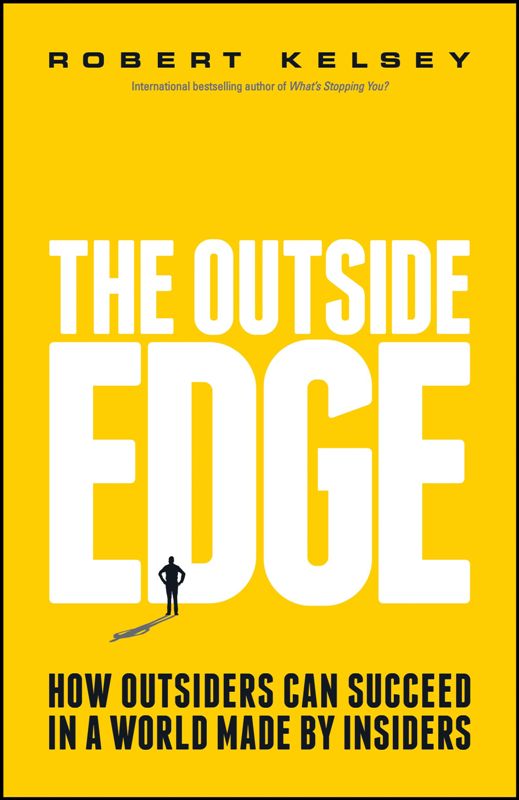Angelina Jolie spoke about being outsider at Nickelodeon’s Kid’s Choice Awards in March. Here, Author Robert Kelsey explains the six signs that you’re an outsider and what to do to ensure success.
‘When I was little, I was told that I was different… I felt out of place, and too loud, too full of fire, never good at sitting still, never good at fitting in…then I realised different is good.’
‘Then I realised different is good’
The above quote comes from Hollywood royalty Angelina Jolie, speaking at the Nickelodeon Kid’s Choice Awards on March 28th 2015. What she’s really saying is that she’s an outsider – a misfit – something confirmed by looking back on her career. From Girl, Interrupted to Maleficent, we can see Angelina gravitate towards the role of the misfit.
https://www.youtube.com/watch?v=khTmPvhYfQE
She’s hardly alone. Steve Jobs, J.K. Rowling, Tracey Emin, Julie Walters and many more have all confessed to feeling like an outsider: that they don’t belong within their particular social group or, for that matter, the groups they later join.
Steve Jobs, J.K. Rowling, Tracey Emin, Julie Walters and many more have all confessed to feeling like an outsider
In fact, millions of people have the same feelings, which can lead to alienation and isolation or – as with the names above – great achievement due to their unique perspective.
6 SIGNS YOU’RE AN OUTSIDER
1. Sensitivity as a very young child
Almost from birth, outsiders tend to be acutely aware of their surroundings, as well as others’ responses to their actions and words. Around one-in-five toddlers experience early-life social reticence – meaning they interact less, cry more, perceive threats more readily and are acutely shy with strangers. And while half will develop social competence by childhood, half will remain ‘behaviourally inhibited’ – potentially into early adulthood.
2. Family stress (divorce etc) as a child
Feeling alienated in early development can stem from strained early-life family relationships, leading to role confusion within the family. Younger-siblings are more prone to such feelings, although parental favouritism, divorce or family estrangement within communities can all generate that crucial ‘disconnection’ that separates us from our brethren.
3. Feeling misunderstood (perhaps later borns or youngest in year)
Family pain can be a result of feeling misunderstood, which – again – is often the role of younger siblings. Many grow up in an atmosphere of confusion, which, in the maelstrom of family life, can go unnoticed – resulting in them feeling misunderstood. This becomes exacerbated at school, which can result in behavioural issues that, ultimately, further separate them from the pack.

4. Dislike of authority
Outsiders are ‘rebels without a cause’. We rail against any imposition of authority almost instinctively. Parents, teachers, community organisers, even people in uniform: the outsider will question their authority and answer back that can last right through to adulthood. Partly, it’s a need to understand the ‘why’ as well as the ‘what’. But partly it’s no more than an innate bloody-mindedness.
5. Distorted empathy (rooting for bad guy)
Outsiders can be cynical, distrustful and disrespectful of social structures, which can lead us to question or even rail against societal norms. Such a distorted worldview can include empathizing with some of society’s more unsavoury elements such as criminals, terrorists, even lone crazies shooting-up shopping malls. Outsiders can understand the mix of isolation, frustration and anger that can lead to such extreme acts, even if we’d never consider actually undertaking such awful deeds.
Outsiders can be cynical, distrustful and disrespectful of social structures
6. Identity issues in adolescence
The oh-so-embarrassing agonies of becoming an adult during adolescence can separate us from our peers, with such feelings generating a potential ‘identity crisis’ that can remain unresolved throughout adulthood. Interestingly, the timing of puberty’s onset can be an important factor, with those both early and late – compared to their peers – generating feelings of isolation and, potentially, deviant behaviour that can force us further towards society’s fringes. Interestingly, it’s early-onset girls that are most in danger of non-normative responses, followed by late onset boys.
The timing of puberty’s onset can be an important factor in generating a potential “identity crisis”

So how should the outsider respond? Should we follow Angelina’s mantra of don’t fit in, don’t sit still, never try to be less than what you are, and when someone tells you that you are different, smile and hold your head up high and be proud?
Should we follow Angelina’s mantra of ‘don’t fit in, don’t sit still, never try to be less than what you are’?
Sure, but that may result in failure and feeling further isolated. Even outsiders should follow some rules to ensure they succeed on their own terms.
5 WAYS TO MAKE BEING AN OUTSIDER WORK FOR YOU
1. Understand and accept who you are
Forget wishing you were someone else, not least because it’s impossible. Instead, develop insight. Understand the early-life conditioning that made you uncomfortable in your own skin. That said, self-criticism can be motivational, and within limits, frustration can be a strong driver,

2. Find meaning
Julie Walters’ most famous film role was as the eponymous Rita in Educating Rita (1983). Her frustration with her fate as a working class baby-factory led to her finding meaning for her life through English literature. She fought self-fulfilling defeatism and found a more enabling outlook. Therefore, discomfort with your surroundings is telling you to look elsewhere. Meaning won’t come in a flash of light though. It evolves from following the right paths for you, often from developing your nascent talents or interests. Nonetheless, have faith: there’s a sustainable niche for you to call your own – you just need to find it (or even invent it).
3. Adopt a growth mind-set
Unfortunately, many outsiders have a fixed mind-set, in which they see their attributes as set-in-stone – making them defensive when challenged. To succeed, a growth mind-set is a must – that means assuming every encounter is a chance to learn more. So ask yourself daily: what are you going to learn today?
To succeed, a growth mind-set is a must – assuming every encounter a chance to learn more
4. Nurture your insight
Outsiders have one key advantage, which they should fully utilise. They’re standing on the outside looking in, watching a play unfold in front of them and able to see the wider perspective. Such insight is so powerful it can turn your disadvantages into advantages. Poor educational attainment, for example, means – like Rita – you’ll value more the education you pursue in adulthood (formal or otherwise). Lack of wealth is another, meaning you’ll understand more the value of money. Even physical disabilities fall into this category – as any Paralympian athlete can tell you.
A wider perspective means you can turn your disadvantages into advantages
5. Participate
Outsiders can assume the world is full of phony people affecting false sincerity. Yet your response shouldn’t be a refusal to participate, which will foster failure, loneliness and despair. Instead, you must participate. Of course, it’s vital you find the right thing in which to participate – hence the (sometimes agonizing) search for meaning. And – within reason – you should only participate on your own terms, although remember that some compromise is inevitable. So play the game, but always with an eye to the main chance.


Like this article? Sign up to our newsletter to get more articles like this delivered straight to your inbox.





















































